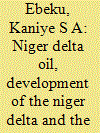| Srl | Item |
| 1 |
ID:
082940


|
|
|
|
|
| Publication |
2008.
|
| Summary/Abstract |
The study critiques the development literature's neglect of the role played by institutions in development, with special emphasis on corruption cleanups. Such neglect is especially problematic in view of the fact that corruption is a major constraint to wealth creation and economic growth in Africa. The policy limitations of traditional development models with respect to corruption can be remedied by incorporating insights from the theory of public choice into the design and execution of new anti-corruption programs. Such insights include the introduction of new and more relevant rules, reform of existing laws and institutions, provision of more effective and relevant incentive structures, and enforcement mechanisms to reduce the profitability of opportunism
|
|
|
|
|
|
|
|
|
|
|
|
|
|
|
|
| 2 |
ID:
082941


|
|
|
|
|
| Publication |
2008.
|
| Summary/Abstract |
This study examines the prevalence and determinants of physical, sexual, and life threatening partner violence experienced by married women, using the 2003 Kenya Demographic and Health Survey data. We found that 40 percent of respondents have ever been abused by their husbands. Physical abuse was the most common form of abuse (36%) followed by sexual (13%) and life threatening (6%) abuses. Logistic regression results show significant effects of gender-power factors on each of the three dimensions of abuse. However, ethnicity is the most significant variable, suggesting that cultural norms play a major role in gender relations and wife abuse in Kenya.
|
|
|
|
|
|
|
|
|
|
|
|
|
|
|
|
| 3 |
ID:
082939


|
|
|
|
|
| Publication |
2008.
|
| Summary/Abstract |
Niger Delta oil contributes immensely to the well-being of the Nigerian State; yet the Niger Delta region remains underdeveloped and its indigenous inhabitants are among the poorest in Nigeria, leading the frustrated indigenous people to engage in frequent oil-related protests. Previous development bodies, such as the Niger Delta Development Commission (NDDC), have failed to bring development to the region for various reasons. This article seeks to consider the Consolidated Council on Social and Economic Development of Coastal States of the Niger Delta (COSEND) - a new development institution recently established by the Government of Nigeria to drive the development of the Niger Delta region - with a view to determining whether it could succeed where similar bodies had failed in the past
|
|
|
|
|
|
|
|
|
|
|
|
|
|
|
|
| 4 |
ID:
082938


|
|
|
|
|
| Publication |
2008.
|
| Summary/Abstract |
The ZANU government of President Robert Mugabe has undertaken a credible measure of land redistribution but has yet to achieve a mutually beneficial land reform among the races in Zimbabwe. Mugabe's desire to alter the structure of economic power in a fair and equitable manner provides validity for land reform and redistribution. However, the government's political tactics in handling land reform along with parsimonious British funding significantly contributed to the failure of achieving the goal of a just, equitable and non-racial society. By conveying a portion of public land to private use, via leasehold contract, both sides stand to gain in a mutually beneficial relationship.
|
|
|
|
|
|
|
|
|
|
|
|
|
|
|
|